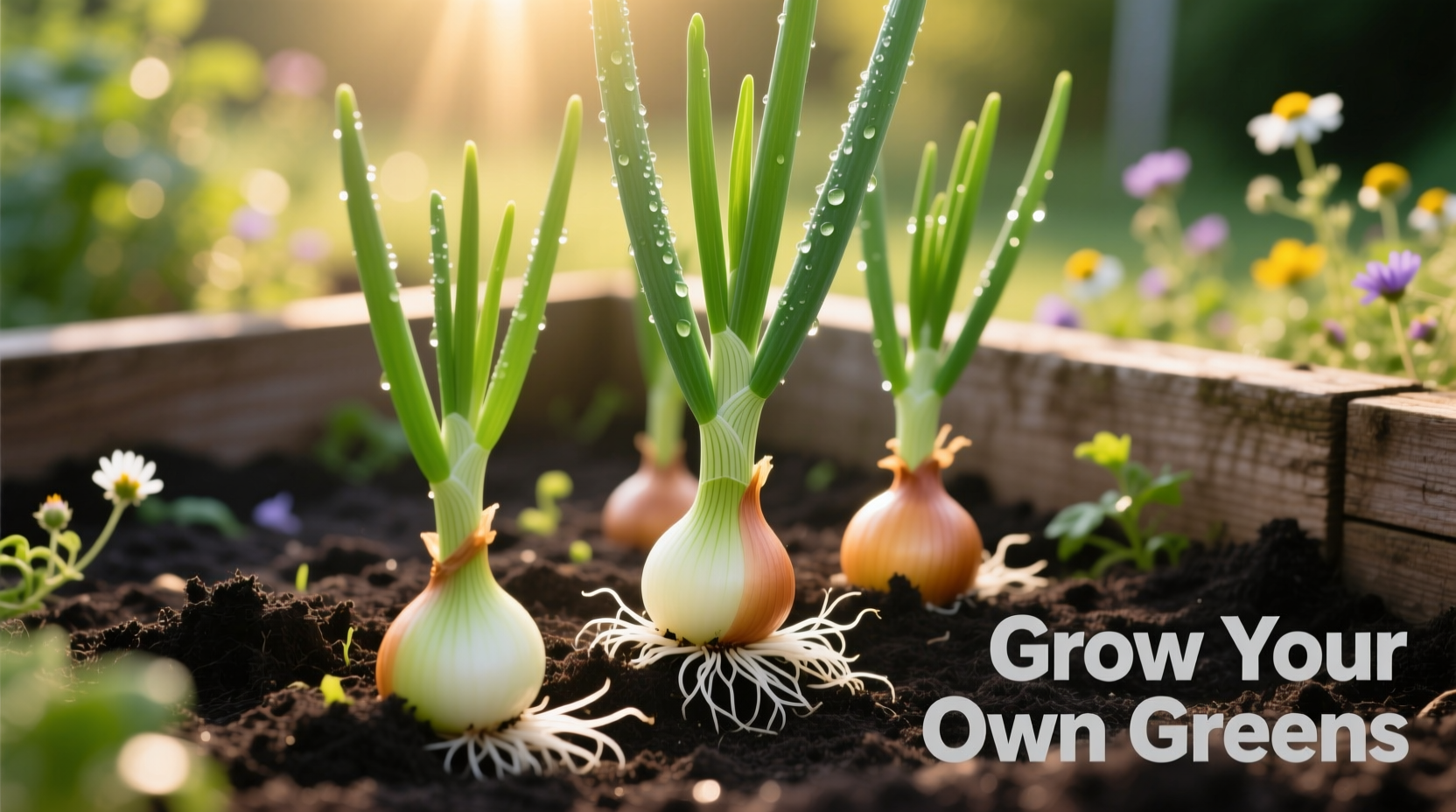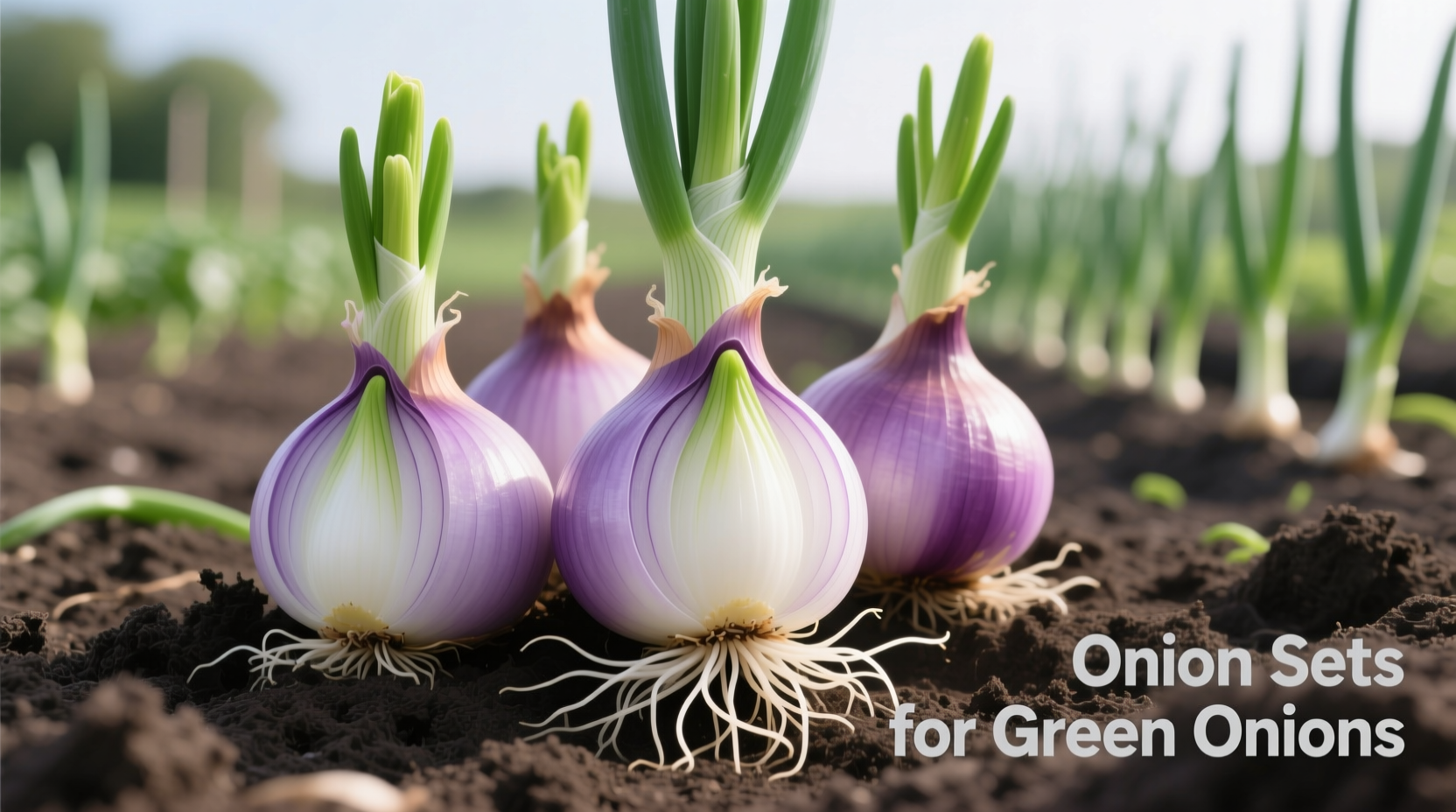Discover how to successfully grow green onions using onion sets with this practical guide. While not the ideal method for serious green onion production, sets provide a fast-track option when you need scallions quickly. Learn which varieties work best, proper planting techniques, and how to maximize your harvest from this convenient gardening shortcut.
Understanding Onion Sets and Green Onion Requirements
Many gardeners confuse onion sets with green onion production methods. Onion sets are small, partially grown bulbs typically used for mature bulb onions. Green onions (scallions) are harvested before bulb formation, requiring different growing approaches.
| Propagation Method | Time to Green Onion Harvest | Flavor Quality | Best For |
|---|---|---|---|
| Onion Sets | 3-4 weeks | Mild, slightly sweet | Quick harvests, beginners |
| Green Onion Seeds | 6-8 weeks | Fuller, more complex | Best quality production |
| Transplants | 4-6 weeks | Most robust | Larger harvests |
According to the University of Minnesota Extension, "While onion sets provide the quickest route to harvest, they typically produce smaller green onions with less developed flavor profiles compared to seed-grown varieties." This fact对照表 reveals why serious green onion growers often prefer seeds despite the longer wait.

When Onion Sets Make Sense for Green Onions
Despite limitations, onion sets offer advantages in specific scenarios:
- Emergency harvest needs - When you need green onions within weeks rather than months
- Cooler climates - Sets establish faster in shorter growing seasons
- Beginner gardeners - Higher success rate than seeds for new growers
- Succession planting - Filling gaps when seed-started plants fail
The Old Farmer's Almanac gardening guide notes that sets work best for green onions when planted in early spring as soon as soil can be worked. This timing aligns with the natural growing cycle of onions and maximizes the short window for set-based green onion production.
Step-by-Step Planting Guide for Green Onions from Sets
Follow these steps to maximize your green onion harvest from sets:
- Select appropriate varieties - Choose smaller onion varieties like White Lisbon or Evergreen Hardy White that won't bulb aggressively
- Prepare soil - Work in 2-3 inches of compost to create loose, well-draining soil with pH 6.0-7.0
- Planting depth - Place sets 1 inch deep with pointed end up, spacing 1-2 inches apart in rows 6 inches apart
- Water immediately - Provide 1 inch of water after planting to settle soil around sets
- Mulch lightly - Apply 1/2 inch of straw to retain moisture without smothering emerging shoots
Unlike bulb onions, green onions from sets require consistent moisture. The Oregon State University Extension recommends maintaining soil moisture at 1-1.5 inches of water per week, adjusting for rainfall. This precise watering schedule prevents premature bolting while encouraging tender green growth.
Troubleshooting Common Problems
When growing green onions from sets, watch for these issues:
- Premature bolting - Sets may bolt (send up flower stalks) if exposed to temperature fluctuations. Harvest immediately when bolting begins.
- Small diameter - Sets naturally produce thinner green onions. Plant closer together for more harvestable material.
- Pest vulnerability - Thrips and onion maggots target young plants. Use floating row covers for protection.
- Limited regrowth - Sets provide only one harvest. For continuous supply, plant new sets every 2-3 weeks.
Research from the Penn State Extension shows that green onions grown from sets have approximately 30% less regrowth capacity compared to seed-grown plants. This limitation affects long-term production planning for gardeners relying solely on sets.
Better Alternatives for Serious Green Onion Production
For gardeners committed to quality green onions, consider these superior methods:
- Specialty green onion seeds - Varieties like Tokyo Long White produce thicker, more flavorful scallions
- Winter-hardy varieties - Plants like Ishikura remain productive through multiple seasons
- Container growing - Grow green onions year-round in pots with proper drainage
- Perennial options - Egyptian walking onions provide continuous harvest without replanting
While onion sets offer convenience, the University of Florida IFAS Extension confirms that "seed-grown green onions develop more extensive root systems, resulting in better nutrient uptake and more robust flavor development." This explains why professional growers rarely rely on sets for commercial green onion production.
Maximizing Your Harvest from Onion Sets
When using sets for green onions, implement these techniques to improve results:
- Harvest when tops reach 6-8 inches tall for optimal tenderness
- Cut 1 inch above the soil line to encourage limited regrowth
- Apply liquid seaweed fertilizer every 2 weeks for stronger growth
- Plant in raised beds for better drainage and earlier spring planting
- Use sets no larger than 1/2 inch in diameter to minimize bolting risk
Remember that onion sets represent a trade-off between speed and quality. They deliver green onions faster but with less substance than other methods. For special occasions when you need scallions immediately, sets provide a valuable gardening shortcut worth keeping in your toolkit.











 浙公网安备
33010002000092号
浙公网安备
33010002000092号 浙B2-20120091-4
浙B2-20120091-4